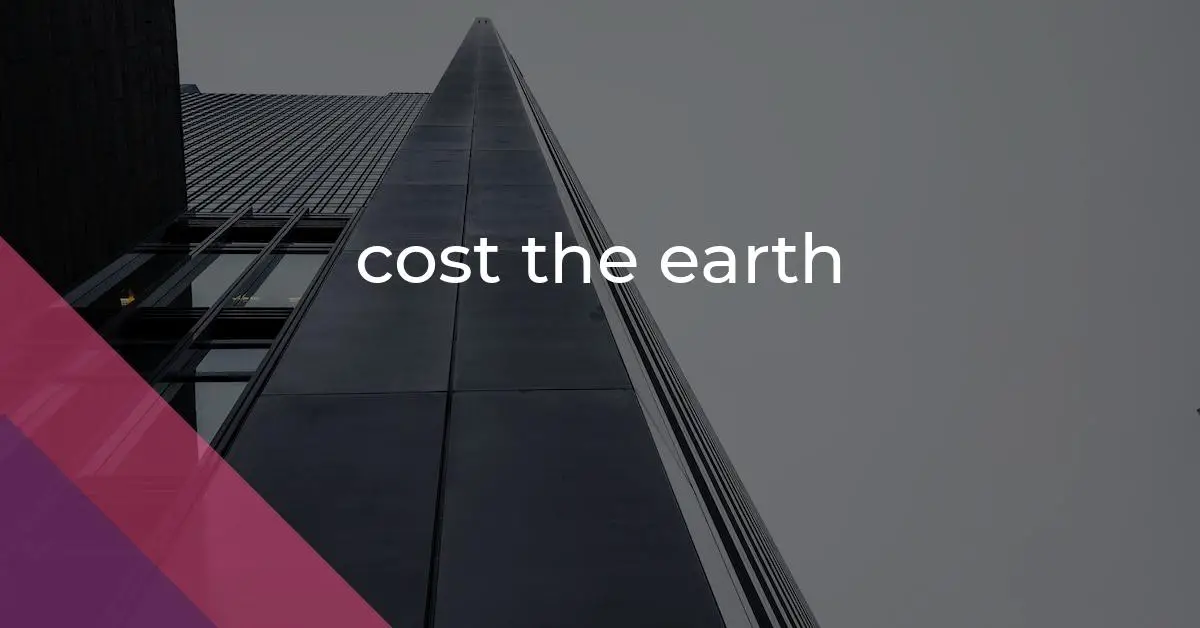cost the earth: Idiom Meaning and Origin
What does ‘cost the earth’ mean?
The idiom "cost the earth" means that something is very expensive or costs a lot of money. This phrase is often used to emphasize how expensive something is, comparing it to the high value of the earth itself.

Idiom Explorer
The idiom "pretty penny" means a significant or large amount of money. It is often used to emphasize the high cost or value of something.
The idiom "end of the world" is used to describe a situation or event that feels extremely dire, catastrophic, or devastating.
The idiom "edge of the earth" is used to describe a feeling of being in a remote, isolated, or faraway place, as if one is at the very limit or furthest point of existence or civilization.
The idiom "ear to the ground" means to be attentive and aware of what is happening or about to happen in a particular situation or context.
The idiom "drop in the ocean" means a very small and insignificant amount compared to the overall need or problem.
The idiom "down-to-earth" means to be practical, realistic, and grounded. It refers to someone who is down-to-earth in their thinking and behaviors, not arrogant or pretentious.
The idiom "down the toilet" means that something has been wasted or lost in a negative or unsuccessful way.
The idiom "down the drain" means that something has been wasted or lost, often due to a mistake or failure.
The idiom "dirt-poor" refers to someone who is extremely poor or impoverished. The term "dirt" implies a level of destitution that is lower than "poor", emphasizing the dire financial situation of the person. The idiom is often used to convey an extreme or severe level of poverty.
The idiom "dime's worth" implies a small or insignificant value, often used to express the lack of significance or impact of something.
A Cosmic Price
The idiom "cost the earth" is a commonly used phrase in English, with a figurative meaning that extends beyond its literal interpretation. It is typically used to emphasize the high price or exorbitant value of an item or service. The origin of this idiom can be traced back to the late 20th century, although the precise source is difficult to determine. It is believed to have emerged in British English and subsequently gained popularity in other English-speaking countries. The phrase seems to have evolved from a combination of the literal meaning of the words "cost" and "earth," where "cost" refers to the amount of money required to obtain something and "earth" signifies a great quantity or extent.
The usage of the idiom "cost the earth" is not limited to any specific context or subject matter. It can be employed in various situations, ranging from discussing the price of luxury goods and real estate to referring to the expenses associated with environmental conservation efforts. The idiom has become ingrained in the English language, permeating both formal and informal discourse.
While the idiom has a clear and widely understood meaning, its inherent figurative nature suggests a deeper layer of significance. Apart from indicating exorbitant prices, "cost the earth" may also invoke a sense of value, scarcity, and the potential consequences of unsustainable actions. By attributing an immeasurable worth to something, the idiom invites reflection on the ecological and environmental implications of our choices.
It is worth noting that the idiom "cost the earth" is not entirely unique in its meaning. There are variations of this phrase in different languages and idiomatic expressions that convey similar concepts. However, the peculiar combination of "cost" and "earth" in this idiom sets it apart, creating a distinctive and memorable image in the minds of its users.
The idiom "cost the earth" is related to other idioms such as "an arm and a leg," "pretty penny," and "edge of the earth." These idioms share a common thread of expressing the high cost or value of something.
The idiom "an arm and a leg" is often used to describe something that is excessively expensive. It conveys the idea that the price or value of the item is so high that it feels like one would have to sacrifice a body part to afford it.
The idiom "pretty penny" is another phrase used to describe something that is costly. It suggests that the price or value of the item is significant enough to be considered quite a sum of money.
The idiom "edge of the earth" is used to emphasize the great expense or value of something. It suggests that the item or service in question is so valuable that it is worth going to the ends of the earth to acquire it.
These related idioms highlight the common theme of emphasizing the high cost or value of something. They serve as additional linguistic tools to convey the idea of extreme expense and further enhance the impact of the idiom "cost the earth."
The idiom "cost the earth" is a powerful linguistic tool that effectively communicates the idea of extreme expense or value. It has roots in British English and has since gained widespread usage in English-speaking countries. While the phrase is commonly employed to describe pricey commodities or services, it also prompts us to consider the broader implications of our actions and the potential consequences of valuing material possessions above all else. The idiom's enduring popularity and cultural resonance attest to its potency in conveying the significance of cost and value.
Example usage
Examples of how the idiom cost the earth can be used in a sentence:
- Buying a brand new luxury car can cost the earth and put a strain on your finances.
- The extravagant wedding ceremony cost the earth, leaving the couple in debt for years to come.
- I really want to go on that dream vacation, but the hotel prices cost the earth, so I have to save up for a while.
More "Expensive" idioms
We missed the mark - nothing found.



